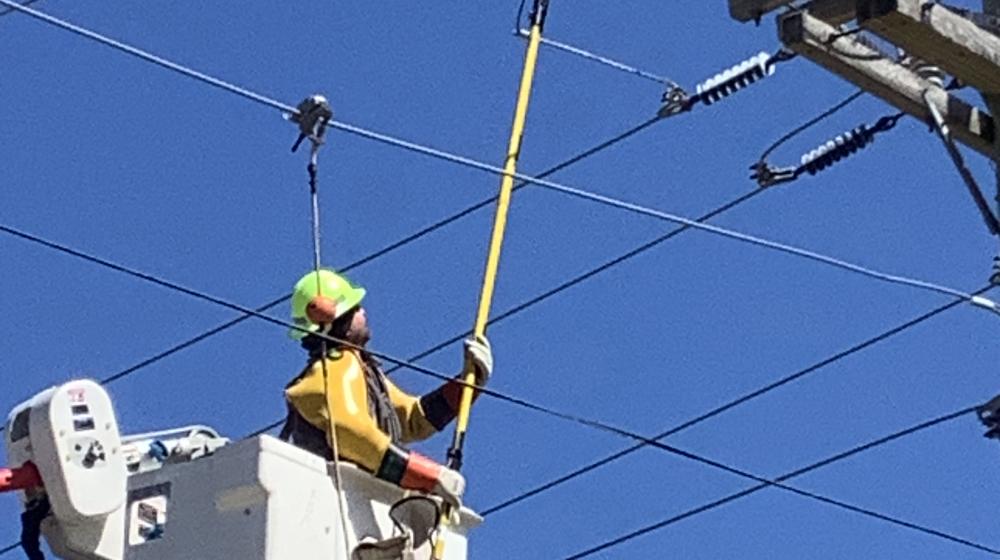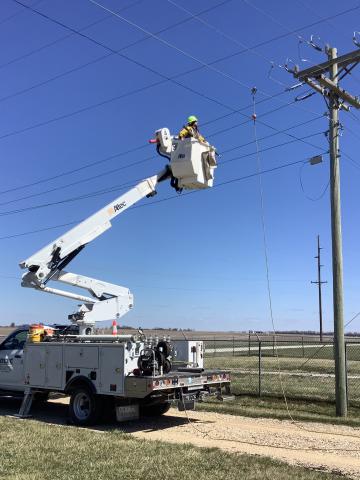
Ralls County Electric Cooperative (RCEC), serving parts of five counties in northeast Missouri, is focused on bringing reliable and modern electric services to its rural members. As a small rural cooperative, RCEC has faced unique challenges in maintaining and upgrading its infrastructure. To help tackle these challenges, the cooperative has turned to Rural Development’s Rural Utilities Service (RUS) Electric Infrastructure Loan & Loan Guarantee Program.
RCEC’s $28.6 million in federal financing is helping the cooperative expand and improve service across its territory, including connecting new consumers through the construction of new distribution lines, upgrading existing lines, and deploying advanced smart grid equipment and fiber infrastructure. This critical investment is consistent with the White House’s determination that a national emergency exists regarding the Nation’s electric system. This also supports the President’s directive that urgent action must be taken to secure sufficient generation, transmission, and distribution of electric energy throughout the United States to avoid disruptions that jeopardize national security, economic stability, and public health. RCEC’s project is part of a national effort to improve grid resilience and update rural electric infrastructure.
Lynn Hodges, CEO of RCEC, sheds light on the cooperative’s mission and the significance of this federal financing for its long-term projects.
“Ralls County Electric is a rural electric cooperative providing electric services to portions of five counties in northeast Missouri,” said Hodges. “As a rural electric cooperative and a very small rural cooperative at that, we are looking for the best financing options as we continue our electric operations.”
The program from RUS offers what Hodges describes as “very competitive financing options” compared to other institutions.
“This program is essential for us,” said Hodges. “It provides reasonable interest rates, which are vital in helping us continue our service in a rural area where the population density is low, and the economic return is not as high as in urban areas.”
In 2023, RCEC began undertaking a multi-year work plan backed by this financing. This plan includes improvements to the electric infrastructure, such as replacing outdated wires, poles, and conductors and implementing smart grid technology.

“There are probably 25 or more projects in this program,” said Hodges. “Everything from replacing old equipment to installing smart grid technology for communications. We’re automating some of our equipment to improve performance and efficiency.”
Some of these projects may span up to five years, depending on the complexity. The ultimate goal of these infrastructure upgrades is to improve reliability and service for members.
“We expect to improve our member service, improve reliability,” said Hodges.” “We’re also working on interconnections with other substations to help us back-feed areas during severe storms.”
These efforts will enhance overall performance and modernize RCEC’s grid, ensuring that it meets the needs of a growing rural community.
The impact of these projects goes beyond just infrastructure improvement. RCEC’s efforts will also benefit the local community economically.
“Being a rural community, we have to be ready to serve new member load and potentially help with economic development,” said Hodges. “Businesses now want to know about reliability and uptime, and our ability to provide reliable service can encourage growth and bring new business to our area.”
While there are clear benefits for the community, RCEC underscores the importance of the RUS program in making these projects possible. Without this program, financing in rural areas would be limited, and the cost of doing business would be higher.
“Without this type of program, the availability of cash is limited,” said Hodges. “The risk and high-interest rates make it much more expensive for us to operate. This program is one of the few ways for us to secure long-term, affordable financing.”
Ultimately, the success of RCEC’s work plan is a testament to the vital role rural electric cooperatives play in ensuring reliable and affordable services for rural communities.
“The big urban electric suppliers of the world don’t really want to serve in our areas because the population densities are low,” said Hodges.” But this program allows rural cooperatives to continue service rural areas that might otherwise be neglected.”
For Hodges and RCEC, the ongoing work funded by the USDA’s Rural Development program is more than just an infrastructure upgrade, it’s a crucial step toward securing the future of rural Missouri and supporting both its communities and economy.
